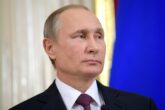September 12, 2019
Russia’s Middle East Power Play
Turkey flouted months of American warnings this summer and took delivery of the Russian-made S-400 air-defense system — triggering Ankara’s expulsion from the F-35 stealth-fighter program and obligating the imposition of additional sanctions by the Trump administration under U.S. law. Most immediately, these developments mark a new and precipitous deterioration in the long-unraveling U.S.–Turkish alliance. But Ankara’s decision to choose a Russian weapons system over a U.S. one also points to a wider and even more ominous geopolitical shift: the growing influence of the Kremlin as a strategic force across the greater Middle East, at America’s expense.
For close observers of the Middle East, Russia’s return as a great-power rival to Washington is as startling as it is disorienting. Leaders from once-stalwart U.S. allies such as Egypt and Saudi Arabia now shuttle regularly to Moscow for high-level consultations about regional developments, while Russian weapons deals and energy investments have proliferated from the Arabian Gulf to the Maghreb. In fractured states such as Lebanon and Iraq, the pursuit of closer ties with Russia has become a rare point of national consensus across sectarian fault lines: Iranian clients look to Moscow as a proven friend, while Tehran’s rivals woo the Kremlin as a potential counterweight to Persian hegemony.
Even Israel, America’s closest Middle Eastern partner, has come to embrace Moscow’s role as a regional power broker, hosting a first-of-its-kind summit of U.S. and Russian national-security advisers in Jerusalem in late June. While both the Trump administration and Israeli officials were quick to portray the gathering as an exercise in isolating Iran — testing the potential to separate the Kremlin from its erstwhile accomplice in Syria — the meeting sent another message to the region: about the acceptance of Russia by the Jewish state as a coequal to the U.S. in shaping the future of the Levant.
Read the full article in National Review.
More from CNAS
-
The Eurasian Century: Hot Wars, Cold Wars, and the Making of the Modern World with Hal Brands
For more than 100 years, the continent of Eurasia has played a central role in global geopolitics. In the 20th century, numerous authoritarian powers from Germany under Kaiser...
By Andrea Kendall-Taylor, Jim Townsend & Hal Brands
-
Putin’s Fight Won’t End With Ukraine
In an essay for Foreign Affairs, titled “Putin’s Point of No Return,” Andrea Kendall-Taylor, senior fellow and director of the Transatlantic Security Program at the Center for...
By Andrea Kendall-Taylor
-
Trump’s Callout of Russia’s Vladimir Putin Is Raising Eyebrows
President Trump is threatening sanctions and tariffs on Russia if Putin doesn't reach an agreement to end the war in Ukraine. Some are surprised, considering Trump's affinity ...
By Andrea Kendall-Taylor
-
In Russia's Perceived War with the West, Arms Control is Collateral Damage
Russia seemingly perceives previously established arms control agreements as elements of the broader Western-dominated political and security order that it aims to overturn....
By Nicholas Lokker




